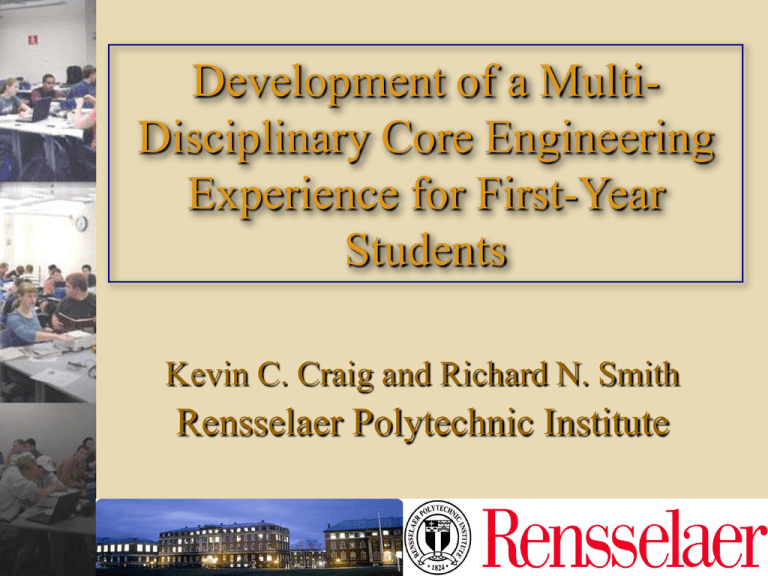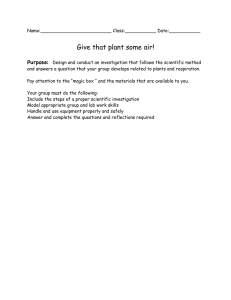Development of a Multi- Disciplinary Core Engineering Experience for First-Year Students
advertisement

Development of a MultiDisciplinary Core Engineering Experience for First-Year Students Kevin C. Craig and Richard N. Smith Rensselaer Polytechnic Institute “ . . . dear old RPI” • • • • Founded 1824 4800 undergraduates 1200 graduates School of Engineering – – – – 2700 undergraduates 7 academic departments 13 B.S. degree programs 145 T&TT faculty • Class of 2009 – 730 engineering students – 24% women; 12% minority Essential Elements of a 1st-Year Engineering Experience • Experience, in an exciting, hands-on, minds-on way, what it is to be an engineer. • Relevance of mathematics, science, social science, and problem finding / solving to the practice of engineering. • Set of integrated skills essential for all engineers: modeling engineering computing engineering measurement data analysis technical communication materials and manufacturing • Exposure to the engineering disciplines. Present Situation • 1st Semester (17 credits) – – – – – Introduction to Engineering Analysis (Statics) (4) Engineering Graphics & CAD (1) Calculus I (4) Chemistry Principles for Engineers (4) H&SS 1st-Year Studies Course (4) • 2nd Semester (17 credits) – Engineering Processes or Introduction to Engineering Electronics (1) – Calculus II (4) – Physics I (4) – Science Elective (4) – H&SS (4) Spring 2005 Pilot Course (following a Fall 2004 Pilot section) • Enrollment: 2 sections – 32 and 35 students • 4-credit free elective (credit for IEE and C Computing) – Engineering System Investigation: Modeling, Measurement, and Computing • Two, 2-hour sessions per week • NI-Elvis plus LabView software • Excel, Matlab/Simullink, Maple, C for microprocessor – Engineering Discovery • One, 2-hour session per week • Projects: Toaster and Humidifier • Special Sections of Eng’g Graphics/CAD – Emphasis on Technical Communication • Assessment: Focus Group Meetings Focal Point: Engineering System Investigation Process Features of the “Discovery” Module • Reverse engineering of elementary engineering artifacts (toaster and humidifier) – Establish links from physics and mathematics background to understand fundamental operation and design • Thermal and mechanical features • Electronics and controls • Materials and manufacturing • Interactive, hands-on activities Principal Observations from 04-05 Pilot Experience • Clear progress in understanding how engineers think and how engineers approach problems • Students felt that they had experienced engineering • Students felt that they would have a “leg up” on peers--teamwork, instrumentation, computing tools, communication • Scalability of the “Discovery” module was questionable Student Comments: Designed to allow you to practice engineering methodology ... and expose you to engineering process It taught me: how to think like an engineer how to use problem solving skills to develop solutions how group work is necessary to problem solve how to work in teams how to plan, model & test how the basic principles of physics & math apply (even if I don’t fully understand it) 14 Fall 2005 Pilot Course • Enrollment: 3 sections – 40 students per section • 2-credit free elective (credit for IEE and C) – Engineering System Investigation: Modeling, Measurement, and Computing (2 credits) • Two, 2-hour sessions per week • Two Discovery “mini-modules” for each section – Examples » Air-conditioning » Bar Code Scanner » Fuel Cell » Autonomous Vehicle Conveyance System Fall 05 – Spring 06 Pilot Course Essential Components • Engineering system investigation process applied to a variety of elementary engineering physical systems. – simple mechanical, electrical, electromechanical, fluid, and thermal systems – analogies among the various physical systems. • Proficiency in the use of important computational tools (MatLab/Simulink, Excel, and Elementary C Programming). • Mini-discovery modules – Bring the excitement of the faculty into the FirstYear experience Magnetic Levitation System Electromagnet Foundations of Engineering Fall 2005 Phototransistor Infrared LED Levitated Ball Some Mid-Semester Survey Results • Is the course having a positive effect on the way you learn and study? (10 point scale) Fall 05 7-10: 51 5-6: 22 Spring 06 7-10: 17 5-6: 4 1-4: 6 1-4: 6 • Is this a course you would recommend to other freshmen students? Fall 05 7-10: 54 5-6: 17 1-4: 9 Spring 06 7-10: 16 5-6: 2 1-4: 7
